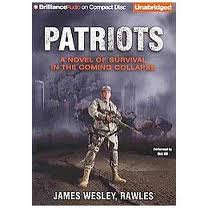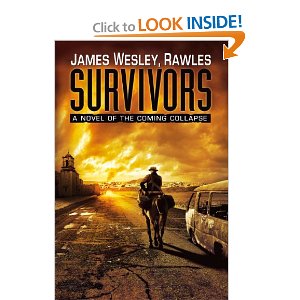Wilson’s Book Review: “Survivors, A Novel of the Coming Collapse”
by James Wesley Rawles
I was highly anticipating this fiction novel because I enjoyed the first fiction novel Patriots by James Wesley Rawles so much. If you are unfamiliar with James Wesley Rawles, he is the author of several books but is also perhaps more notably the editor of SurvivalBlog.com. SurvivalBlog is chock full of practical insight, how-to’s, practical homesteading content and Godly wisdom for living the self-sufficient lifestyle.
All of the James Wesley Rawles books share the same characteristic writing style which is very unique for three reasons: (1) it is highly instructive, (2) it is very descriptive of plausible fictional scenarios written in story form in the past tense, (3) and the deliberate references to faith in God. It is important to note that Survivors was written with a contemporaneous timeline (both plots occur simultaneously) to the book Patriots. You do not have to read (or re-read) Patriots to follow along with this book, but it would definitely help.
Survivors will not disappoint on any of the three pillars of Rawles’ writing style. There is a list in the beginning of the book of characters that appear throughout the book as the plot weaves past and present happenings into one coherent tale of the protagonist’s (Captain Andrew Laine) anything-but serendipitous journey home to New Mexico from Afghanistan. On a personal note, the book picked up on an interesting thread in my own life as the character travels back from Afghanistan to Germany (a trip I have made personally many times).
My top priorities for a James Bond movie always include making sure justice prevails, that the new gadget is sufficiently cool, gawking at the car and ensuring that James gets the girl at the end of the movie. No spoilers here, but in Survivors rest assured the main character Andy does get the girl. The plot moves along nicely and the book does cast the net wide to include a bigger audience. For example, those who are not familiar with military colloquialisms will not get a lot of the humor and turn of phrase used in parlance; likewise the detailed love story between reappearing characters from Patriots (Ian and Blanca Doyle) in chapter 24 (“Down in Hondo”) was not geared toward me—but Chaya would like it a lot. Other internet critics of Rawles have said that he is focused on “white Christians” (whatever that means) to the point of violating some diversity ordinance somewhere. Survivors includes a whole range of characters, orphans, disabled veterans, widows, poor, women, children and people who are definitely not “white” (sorry but my lack of a PC vocabulary does not leave you with a better working definition of that group). It includes all looking to live in the face of this fictional adversity as depicted in the book or on SurvivalBlog.
One other criticism that I heard or James Wesley Rawles Books was that it was the post-apocalyptic life of people (none of whom had children!) who must have had quite the check book to afford all of that gear before the crunch. In Patriots when Todd Gray and his wife pick their retreat in Idaho it mentions that “they paid cash.” That makes for a great story, but the book did lose some of its voice with me as that is just not part of my reality. Survivors is the story of much more real people without the benefit of a trust fund who make due with ingenuity in a true “skills trumps stuff” fashion. For example, on p. 82 you read about the recently widowed character Shelia Randall open up a small trading post/store in rural Kentucky after she and her family “bugged out.” James Wesley Rawles also handily weaves the value of the free market throughout the book.
The characters in the book are believable. For example, the brief mention of Chambers Clarke who was the undersecretary of information in the new ProvGov has this written of him, “Before the Crunch, Clarke had been a fertilizer and pesticide salesman for Mansanto Company” (Rawles, 2011). Not that anyone is going to be a big fan of the ProvGov, but that short resume is just not helping me like Chambers Clarke one bit. One character that I really liked (and not mentioned in the early list of characters) is the “super horse” Prieto who is indispensible in Andy’s return to New Mexico. What I know about horses might fill up a 3” X 5” index card. Again, here is one more of the examples of the style we see in James Wesley Rawles books of unobtrusively instructing the reader throughout the story. The reader if he/she was not implicitly paying attention would learn a lot about morse code, firearms, horses, electronics, bartering items and even human nature erstwhile reading a great fictional novel. For Example, p. 83 mentions the “All-American Five” shortwave radio being operated on either DC or AC, p. 124-126 is a crash course in morse code and ham radio protocol, p. 146-148 is a great treatise on the true value of silver lovingly written in a letter format from a father to his sons, p. 153-154 is a condensed retreat rules poster, p. 300 deals very truthfully with the realities of using lethal force in self defense, etc.
If you are not planning on buying the book, but do pass by it in a library or pick up a friend’s copy please read chapter 20 “Tentacles,” especially if it is the only chapter you read. Pay attention to the conversation on pp. 159-168 between Lars Laine (Andy’s brother) and L. Roy Martin. I read that chapter four times because the truths expressed in that conversation between those two men are an absolutely fundamental treatise on human nature. On p. 162 is my favorite quote from the whole book:
“But storage is no more than limited capital to allow people the time to grow more food” (Rawles, 2011).
Survivors unashamedly points to the sustaining power of faith in God summed up in the William Penn quote on p. 77, “If man is not governed by God, he will be ruled by tyrants.” The book drives home the point that the Christian faith is fundamental for maintaining a moral compass and a sense of hope—two things that every one can use now and if things go really badly in the future. I was very pleased to see that there are both Anabaptists and Messianic Jewish families mentioned in the story as those two faiths are represented where we live in Montana; both of which have both personally helped Chaya and I a great deal to get acclimated here. The cadre of writers who make up the small body of preparedness catalog of literature is not very big at all, and there are differences of opinions in that group to be sure. You are not going to get a monolithic cannon of rationality from any group of people. For example I disagree with James Wesley Rawles on the Reformed view of free will and the elect (reference p. 300). However, the topic of faith is so critical to me that I have to high-light this point once more by saying that those writers (like Rawles) who do mention this inescapable logic of the need for faith in their craft really are paving the right road for many reasons. Rawles even has a page on SurvivalBlog about the importance of prayer.
The book does close with loose ends, and I have read negative criticism elsewhere on the internet about Survivors regarding this point. Not to worry Rawlesian readers! JWR does plan on writing a third contemporaneous novel to form a trifecta when he releases Founders which will feature a cross country trek of two people. I would expect all of the story’s business to be wrapped up then.
Final thoughts: I liked the book by James Wesley Rawles a lot. It is not the page-turner preparedness primer that Patriots was, but it is well worth the read and has something for everyone. Mind the provisos and disclaimers at the beginning with a strong dose of “do not try this at home” especially when it comes to “borrowing” an F-16 to pick up a stranded loved one . . . I’m just sayin’ . . .
Wilson
Pro Deo et Patria
Rawles, A. W. (2011). Survivors, a novel of the coming collapse. (p. 267). Beyond Words/Atria Books.
Rawles, A. W. (2011). Survivors, a novel of the coming collapse. (p. 162). Beyond Words/Atria Books.


